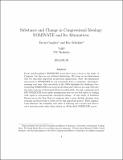Substance and Change in Congressional Ideology: NOMINATE and Its Alternatives
Author(s)
Schickler, Eric; Caughey, Devin
DownloadCaughey_Substance and change.pdf (398.4Kb)
OPEN_ACCESS_POLICY
Open Access Policy
Creative Commons Attribution-Noncommercial-Share Alike
Terms of use
Metadata
Show full item recordAbstract
Poole and Rosenthal’s NOMINATE scores have been a boon to the study of Congress, but they are not without limitations. We focus on two limitations that are especially important in historical applications. First, the dimensions uncovered by NOMINATE do not necessarily have a consistent “ideological” meaning over time. Our case study of the 1920s highlights the challenge of interpreting NOMINATE scores in periods when party lines do not map well onto the main contours of ideological debate in political life. Second, commonly used DW-NOMINATE scores make assumptions that are not well suited to dealing with rapid or non-monotonic ideological change. A case study of Southern Democrats in the New Deal era suggests that a more flexible dynamic item response model provides a better fit for this important period. These applications illustrate the feasibility and value of tailoring one’s model and data to one’s research goals rather than relying on off-the-shelf NOMINATE scores.
Date issued
2016-07Department
Massachusetts Institute of Technology. Department of Political ScienceJournal
Studies in American Political Development
Publisher
Cambridge University Press
Citation
Caughey, Devin, and Eric Schickler. “Substance and Change in Congressional Ideology: NOMINATE and Its Alternatives.” Studies in American Political Development 30.2 (2016): 128–146.
Version: Original manuscript
ISSN
0898-588X
1469-8692